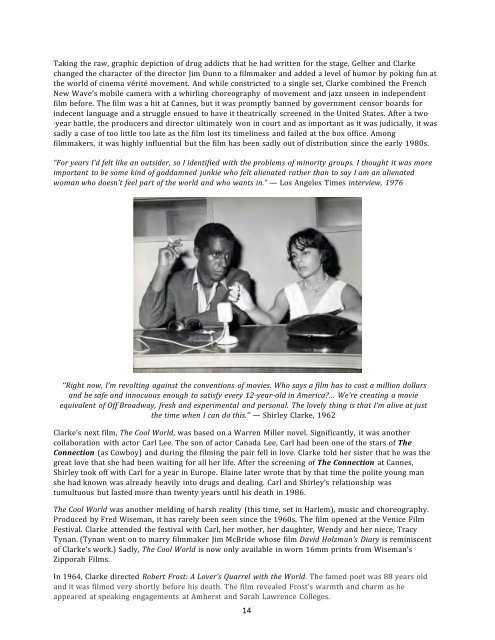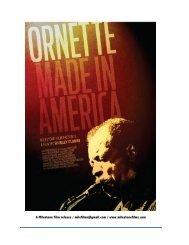Press Kit - Shirley Clarke
Press Kit - Shirley Clarke
Press Kit - Shirley Clarke
You also want an ePaper? Increase the reach of your titles
YUMPU automatically turns print PDFs into web optimized ePapers that Google loves.
Taking the raw, graphic depiction of drug addicts that he had written for the stage, Gelber and <strong>Clarke</strong> <br />
changed the character of the director Jim Dunn to a filmmaker and added a level of humor by poking fun at <br />
the world of cinema vérité movement. And while constricted to a single set, <strong>Clarke</strong> combined the French <br />
New Wave’s mobile camera with a whirling choreography of movement and jazz unseen in independent <br />
film before. The film was a hit at Cannes, but it was promptly banned by government censor boards for <br />
indecent language and a struggle ensued to have it theatrically screened in the United States. After a two-‐<br />
-‐-‐year battle, the producers and director ultimately won in court and as important as it was judicially, it was <br />
sadly a case of too little too late as the film lost its timeliness and failed at the box office. Among <br />
filmmakers, it was highly influential but the film has been sadly out of distribution since the early 1980s. <br />
“For years I’d felt like an outsider, so I identified with the problems of minority groups. I thought it was more <br />
important to be some kind of goddamned junkie who felt alienated rather than to say I am an alienated <br />
woman who doesn’t feel part of the world and who wants in.” — Los Angeles Times interview, 1976 <br />
<br />
‘‘Right now, I’m revolting against the conventions of movies. Who says a film has to cost a million dollars <br />
and be safe and innocuous enough to satisfy every 12--year--old in America?… We’re creating a movie <br />
equivalent of Off Broadway, fresh and experimental and personal. The lovely thing is that I’m alive at just <br />
the time when I can do this.’’ — <strong>Shirley</strong> <strong>Clarke</strong>, 1962 <br />
<strong>Clarke</strong>’s next film, The Cool World, was based on a Warren Miller novel. Significantly, it was another <br />
collaboration with actor Carl Lee. The son of actor Canada Lee, Carl had been one of the stars of The <br />
Connection (as Cowboy) and during the filming the pair fell in love. <strong>Clarke</strong> told her sister that he was the <br />
great love that she had been waiting for all her life. After the screening of The Connection at Cannes, <br />
<strong>Shirley</strong> took off with Carl for a year in Europe. Elaine later wrote that by that time the polite young man <br />
she had known was already heavily into drugs and dealing. Carl and <strong>Shirley</strong>’s relationship was <br />
tumultuous but lasted more than twenty years until his death in 1986. <br />
The Cool World was another melding of harsh reality (this time, set in Harlem), music and choreography. <br />
Produced by Fred Wiseman, it has rarely been seen since the 1960s. The film opened at the Venice Film <br />
Festival. <strong>Clarke</strong> attended the festival with Carl, her mother, her daughter, Wendy and her niece, Tracy <br />
Tynan. (Tynan went on to marry filmmaker Jim McBride whose film David Holzman’s Diary is reminiscent <br />
of <strong>Clarke</strong>’s work.) Sadly, The Cool World is now only available in worn 16mm prints from Wiseman’s <br />
Zipporah Films. <br />
In 1964, <strong>Clarke</strong> directed Robert Frost: A Lover’s Quarrel with the World. The famed poet was 88 years old <br />
and it was filmed very shortly before his death. The film revealed Frost’s warmth and charm as he <br />
appeared at speaking engagements at Amherst and Sarah Lawrence Colleges.<br />
14




